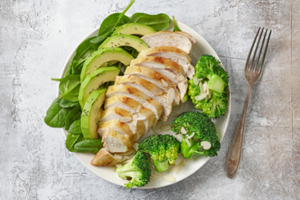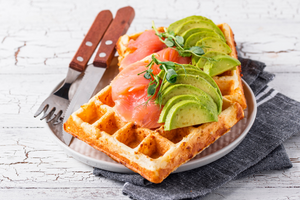
Let’s start out this page with something that will become painfully obvious pretty quickly, I’m not a doctor, nor am I an expert in ketogenic science. We were hesitant to do a science page for those very reasons, but I (Bill) found when I started my journey I needed to know the hows and why’s of Keto and the lifestyle I was about to undertake. Due to that, there must be others out there that need and crave that information as well, so in the interest of education this page will share what I have learned about Ketosis and the scientific reasoning behind why it is so effective in improving your quality of life.
I have been very upfront about my lack of medical training, but as a former journalist I am well versed in research and showing both sides of an issue. Keto can be controversial as you will find out… your new habits will contradict the medical communities best guidance for the last 50-years.
All we can do is show you the science in layman’s terms and open ourselves up to questions that come out of that. I hope you appreciate the information provided and please visit the FAQ page for the most common of Keto questions… and never be scared to do your own research. – Bill

The Ketogenic Science Basics
The most basic of question of Keto is… what is it. In really basic terms its switching your body to using fat as a primary energy source instead of the carbohydrates most people use today. Carbs are converted to sugar by our bodies, a diet high in sugars has your body producing a lot of insulin which leads to issues such as diabetes, weight gain, heart disease, and has been linked to things such as strokes and dementia.
A keto lifestyle cuts out those carbs and high sugar foods depriving your body of its primary energy source. With nothing to feast on your body begins to convert your stored fat into what are called ketones. Those ketones then start to get burned off in a similar manner to what carbs once were. You are LITERALLY turning your body into a fat burning machine. With fat being higher in calories you tend to eat less at meal time as well. This means less energy is coming in and your body begins to burn what you already have… fat. The before and after pictures you will see on this page and thousands of others are people that found out your body wants to get rid of that belly and thighs. It wants to get you into smaller clothes and a healthier lifestyle. You just need to show it how to get there.
Keto begins with a term that you will hear a lot… macros. Macros or macronutrients are the three items that make up food. Fat, Protein, and Carbohydrates. We aim on keto to take in 70% of our calories through fat which your body will eventually be using as its fuel source. Protein makes up another, which represents 20% of the calories you will take in, and carbs, (good healthy carbs) make up the rest which is about 10% or under 20-grams a day.



Fat is the cornerstone and backbone of the Keto lifestyle. In order to get your body into the state known as ketosis you need to switch it from a carb burning machine to a fat burning machine. This is done by increasing the healthy fats you take in and drastically decreasing carbohydrates. Examples of high fat foods are butter, olive oil, and a staple… eggs.
If fat is the leader in the ketogenic lifestyle then protein is its right hand man. Protein is needed for muscle repair and growth. Protein is a true building block of our bodies. However large amounts of protein can see some of it converted to sugars which will effect your state of ketosis. We aim to take in 20% of our calories from protein to keep lean muscle.
When looking at Keto information you are going to see carbohydrates or “carbs” get a bad rap time and time again. Over the years our diets have been increasingly carb leaning with a lot of processed foods and sugars. Many think this has led to the current obsesity crisis. We do need to be honest that our ancestors didn’t have a lot of fruit roll-ups to hunt.
Some Math
I can hear you now… what in the sweet hell does all that mean? Lets put it into practical terms. If you look at eggs. A single egg has 6-grams of fat, 1-carb, and 7-protein. Fat has more calories then the other two so its percentage is naturally higher. For every gram of fat you take in 9 calories so an egg has 54 calories of fat. For each gram of protein and carbs, you take in just four calories. That means an egg has 54 calories of fat, 4 calories from carbs, and 28 calories from protein. That math looks like this:
6g Fat X 9 Calories = 54 calories
1g Carbs X 4 Calories = 4 calories
7g Protein X 4 Calories = 28 Calories
This means an egg has 86 calories and its macros are:
Fat – 54/86 = 63%
Carbs – 4/86 = 5%
Protein – 28/86 = 32%
So the macros of an egg work out to 63% fat, 32% protein, and 5% carbs.
I promise that is as indepth in the math world as we will go. There are people who attest to the theory of just stay under 20g of carbs a day and the world is your keto heaven, we choose to do the math, weigh the food, and continue to see the results we do. The only way to do that with confidence in yourself is be able to figure out your macros. To aid in that we have opened up our worksheets for purchase under the Helpful Products page or there are several free apps to ad in figuring out macros.
Also, just a side note when looking at macros don’t be surprised if you are out by a couple of percentage points. Rounding of numbers and things such as calories from fiber can also skew the numbers a bit.
Speaking of our healthy friend fiber… it comes into play when you hear the term “net carbs.” A lot of keto lingo revolves around figuring out the net carbs and as with everything, that comes with its share of controversy. The simplest way to figure out how many carbs are in something is look at carbohydrates on the label and subtract the fiber. That is your true net carbs. Unfortunately what you will see a lot of is people also subtracting things like sugar alcohols to figure out net carbs. Without getting too medical, alcohol is a fuel source unto itself and is burned ahead of everything else. Food high in alcohols can kick you out of ketosis as your body doesn’t have the need to burn the fat you provided. Safest bet is to subtract just the fiber when figuring out carbs.

Is Keto Safe?
The ketogenic way of thinking has been around since the 1920’s to help people with severe epilepsy. Switching to a keto diet lowers blood sugars which in turn lowers insulin production. This was proven to aid in lowering the amount of seizures people had, but had the pleasant side effect of rapid weight loss and increases in areas like focus and energy. Some will argue that keto doesn’t provide the nutrients needed to keep the brain healthy, but eating proper healthy fats supplemented with vegetables and a few supplements provides the body more than enough. So is it safe? Ask the millions of people around the world that lead a happier, healthier, and more productive life.

What About Healthy Eating?
This is the question that leads to the biggest keto conspiracy’s and silly conversations. You are going to have people in your life say, “how can that much fat be good for you?” The truth is, the “healthy” diet of a plate full of fruits and vegetables with all the fat trimmed off an overcooked peice of meat hasn’t worked either. History shows that for many years people ate what is much closer to a keto lifestyle than that of the processed sugar fueled foods found in the aisles of grocery stores today. Its only been roughly the last 60-years that corn and wheat based products took over as the primary source of food. That 60-years just happens to coincide with a rampant increase in obesity and diabetes.

Why Doesn’t Everyone Do Keto?
The simple answer might be fear, the complicated answer is we have been programmed from the time we were small children to eat our fruits and veggies while following along with the food pyramid. Keto flips that pyramid upside down and actually works. That can be scary. The thought of a global conspiracy to shut down what is actually healthy eating is next to impossible. Keto isn’t for everyone, we can only speak to what it has done for us and the immense impact cutting out carbs has had on us. Is there a conspiracy? Maybe? Does it matter? No. Bettering yourself doesn’t have to be a topic for conversation. Coming to keto is you learning to take control of food. No matter what food it is.

What Are the Risks to Keto?
Are there risks with starting a ketogenic lifestyle? Any change to the core way you live your life can come with some risk. You will literally withdraw from sugar and get the dreaded “keto flu.” In reality its not the flu at all, its water being flushed out of your system at a high rate as bloating decreases. Some magnesium and increasing the amount of water you take in will solve it pretty quick. Contrary to popular belief the increased fat won’t raise your cholesterol either. Some very concrete and recent studies show that people who introduce healthy fats to their diet have seen signficant decreases in their numbers. Practical advice says see a doctor before any life change, but calling Keto a risk is a stretch.
There are literally hundreds of very technical topics we can get into on this page and in time we will, but this is a good start for now. As the page grows through both the FAQ and Blog Sections we will update periodically. Remember to keep asking those questions and doing the research you need to learn about a ketogenic lifestyle. We are here to help and share with you.
